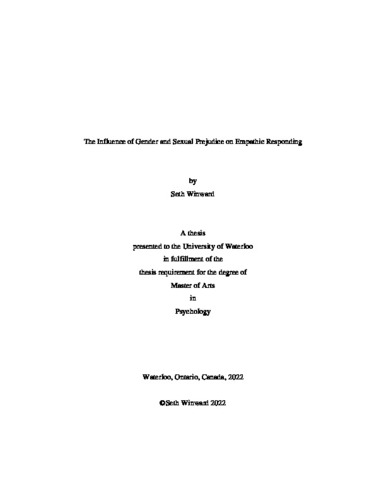| dc.description.abstract | Although studies of the relationship between empathy and racial prejudice have become increasingly popular in recent years, there is comparatively little research on the potential relationship between empathy and sexual prejudice. A handful of studies exclusively using trait measures indicate that sexual prejudice is negatively related to empathy, and the existing literature on sexual prejudice implies that this relationship may be modulated by participant and target gender. We investigated whether these relationships persist using state measures of empathy, outside of previously targeted social contexts. Participants in two samples (n1 = 99, n2 = 113) completed trait measures of sexual prejudice and empathy online. A few weeks later, they completed an online study advertised as a memory study. Participants read brief text vignettes describing gay/lesbian or straight male and female characters in emotionally negative and neutral scenarios and rated their empathy for the target character after each vignette. Empathy ratings were significantly higher for negative than neutral scenarios but there was no interaction with target sexual orientation and no further modulation by participant gender. In line with previous research, trait empathy was positively correlated with empathy ratings, negatively correlated with trait sexual prejudice, and was higher for female than male participants. Although the relationship between sexual prejudice, gender, and empathy was not supported at the state level, the results illustrate a potential disconnect between trait and state measures of empathy. We discuss potential explanations for the seemingly differential influence of various forms of social prejudice on state and trait empathy. Issues with habituation and fatigue, which may confound state measures of empathy, are also discussed. | en |

